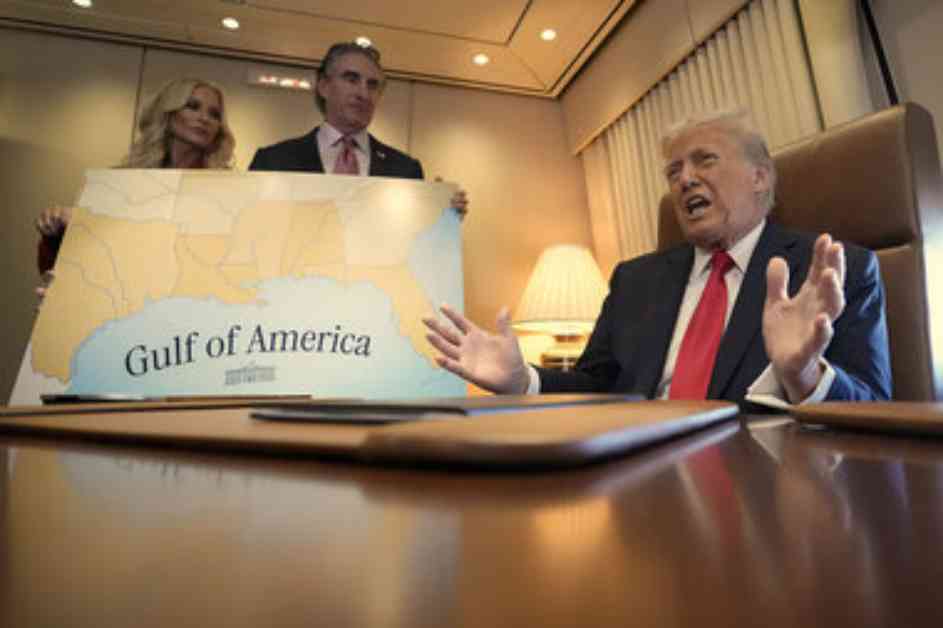President Donald Trump has been known for his attacks on the media, often dismissing unfavorable coverage as “fake news” and singling out specific reporters or outlets. As he enters his second term, his war on the press appears to be intensifying. In a surprising move, Mr. Trump won a settlement against ABC News after filing a lawsuit, leaving many industry experts shocked. Additionally, Elon Musk’s Department of Government Efficiency has been cutting government subscriptions to news publications with enthusiasm. The Federal Communications Commission’s new chair has launched an investigation into NPR and PBS funding, while the Pentagon has displaced legacy media outlets from their longstanding workspaces to make way for more Trump-friendly sources.
One of the most contentious issues recently has been the renaming of the “Gulf of Mexico” to the “Gulf of America” by an executive order issued by President Trump. The Associated Press (AP) has been at the center of this dispute, as they have chosen to continue using the original name despite acknowledging the president’s new title. This defiance led to AP reporters being barred from various official events, including access to the Oval Office and Air Force One. The Monitor, which typically follows AP Stylebook guidelines, plans to adopt a similar stance.
First Amendment Concerns
Both the AP and the White House Correspondents’ Association argue that the Trump administration’s actions are a violation of the First Amendment. This led the AP to file a lawsuit against three administration officials on these grounds. However, the administration maintains that restricting access to certain spaces is different from controlling the content published by news outlets. The power dynamic seems to favor the president, given the current weakened state of the press, which faces challenges such as declining subscriptions and fragmented audiences.
Jason Shepard, a communications law professor, notes that President Trump has been successful in undermining traditional institutions, including the press. With limited resources available for news organizations to push back, the freedom of the press is under threat. The dispute over the Gulf naming issue underscores the larger concern about press freedom in a democracy.
The Battle Over Language
The AP’s use of the term “Gulf of America” has drawn criticism from Trump allies, who argue that the AP Stylebook has become increasingly ideological in recent years. The administration’s objection to the AP’s language is considered valid by experts, but pressuring news outlets to conform to a specific narrative raises constitutional concerns. The administration’s actions raise questions about the limits of First Amendment protections in the face of government interference.
The controversy is further complicated by the involvement of the press pool, a group of journalists that follows the president and provides coverage to the broader press corps. The exclusion of AP reporters from certain events challenges the established norms of press access and raises the stakes for media freedom. While legal experts debate the constitutionality of the administration’s actions, the potential implications for press freedom remain a subject of concern.
Historical Context and Contemporary Impact
President Trump’s confrontations with the media are not unprecedented, as past presidents have also clashed with the press. However, the current attacks on the media come at a time when the industry is already facing significant challenges. The AP’s loss of subscribers and the cancellation of government subscriptions to various news outlets highlight the financial pressures on the media.
President Trump’s aggressive stance against the press has been emboldened by recent legal victories, including settlements in defamation lawsuits against major news networks. The administration’s efforts to challenge media coverage through legal action signal a broader strategy to intimidate news organizations and limit their resources. The implications of these actions extend beyond individual disputes, as they raise fundamental questions about the role of the media in a democratic society.
In conclusion, the ongoing conflict between President Trump and the press underscores the critical role of a free and independent media in holding power to account. As the administration takes increasingly aggressive measures against the press, the broader implications for press freedom and democratic norms are at stake. The outcome of this battle will shape the future of journalism and the public’s right to information.

